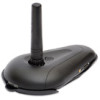Garmin GDL 39 User's Guide - Page 28
External ADS-B Blade Antenna (Optional)
 |
View all Garmin GDL 39 manuals
Add to My Manuals
Save this manual to your list of manuals |
Page 28 highlights
3.2.2 External ADS-B Blade Antenna (Optional) A blade-type ADS-B antenna is mounted on the exterior of the aircraft. Connection is made by unscrewing the antenna on the GDL 39 and attaching the cable from the external antenna to the female SMA connector on the top of the GDL 39. The GDL 39 requires a UHF antenna that meets the following specifications: • Standard 50 ohm vertically polarized antenna with a VSWR < 1.7:1 at 978 MHz and < 1.5:1 at 1090 MHz. • TSO-C66, TSO-C74, or TSO-C112 antennas that also meet the VSWR specification. NOTE: Certain types of transponder antennas that utilize very thin radiator elements are only intended for use at 1030 and 1090 MHz. These types of antennas should be evaluated on a model-by-model basis to determine their suitability as UAT data link antennas. 3-10 Garmin GDL 39 Portable ADS-B and GPS Receiver User's Guide 190-11110-00 Rev. C















